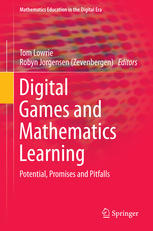

Most ebook files are in PDF format, so you can easily read them using various software such as Foxit Reader or directly on the Google Chrome browser.
Some ebook files are released by publishers in other formats such as .awz, .mobi, .epub, .fb2, etc. You may need to install specific software to read these formats on mobile/PC, such as Calibre.
Please read the tutorial at this link: https://ebookbell.com/faq
We offer FREE conversion to the popular formats you request; however, this may take some time. Therefore, right after payment, please email us, and we will try to provide the service as quickly as possible.
For some exceptional file formats or broken links (if any), please refrain from opening any disputes. Instead, email us first, and we will try to assist within a maximum of 6 hours.
EbookBell Team

4.3
28 reviewsDigital games offer enormous potential for learning and engagement in mathematics ideas and processes. This volume offers multidisciplinary perspectives—of educators, cognitive scientists, psychologists and sociologists—on how digital games influence the social activities and mathematical ideas of learners/gamers. Contributing authors identify opportunities for broadening current understandings of how mathematical ideas are fostered (and embedded) within digital game environments. In particular, the volume advocates for new and different ways of thinking about mathematics in our digital age—proposing that these mathematical ideas and numeracy practices are distinct from new literacies or multiliteracies. The authors acknowledge that the promise of digital games has not always been realised/fulfilled. There is emerging, and considerable, evidence to suggest that traditional discipline boundaries restrict opportunities for mathematical learning. Throughout the book, what constitutes mathematics learnings and pedagogy is contested. Multidisciplinary viewpoints are used to describe and understand the potential of digital games for learning mathematics and identify current tensions within the field.
Mathematics learning is defined as being about problem solving; engagement in mathematical ideas and processes; and social engagement. The artefact, which is the game, shapes the ways in which the gamers engage with the social activity of gaming. In parallel, the book (as a te
xtual artefact) will be supported by Springer’s online platform—allowing for video and digital communication (including links to relevant websites) to be used as supplementary material and establish a dynamic communication space.